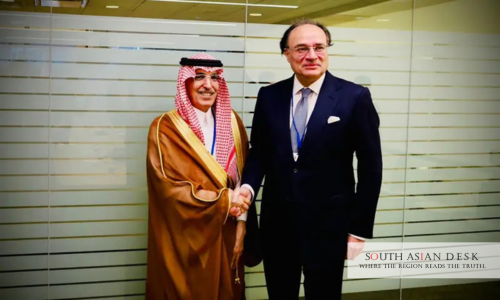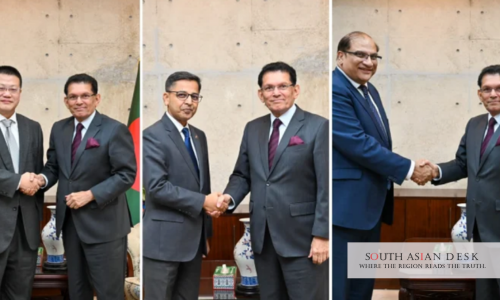Finance Minister Muhammad Aurangzeb met Saudi Finance Minister Mohammed Al-Jadaan in Washington DC on 15 October 2025. He briefed him on the ongoing PIA privatisation push and key airports. The discussion occurred on the sidelines of IMF and World Bank annual meetings. This step underscores Pakistan’s economic reform commitments.
Bolstering South Asian Economic Stability
The meeting highlights Pakistan’s strategic outreach to Gulf allies for investment support. It aligns with the $7 billion IMF bailout package, which mandates state-owned enterprise reforms. Successful privatisations could reduce fiscal burdens and attract foreign capital, fostering regional trade growth in South Asia. Stronger Pakistan-Saudi ties may enhance energy and infrastructure projects, benefiting broader economic integration.
PIA Privatisation Push Advances Under IMF Scrutiny
Pakistan’s privatisation drive targets loss-making entities like PIA to achieve fiscal discipline. The national carrier, burdened by PKR 500 billion in debts, faces divestment by November 2025. This timeline forms a core condition of the IMF programme approved in 2024.
Aurangzeb emphasised transparency in the process during the talks. He noted the government’s resolve to draw strategic investors. The PIA privatisation update includes shortlisting bidders and regulatory approvals. Officials expect completion soon to unlock funds for debt repayment. The airline’s restructuring separates viable operations from legacy liabilities. This model aims to revive operations and expand routes. Recent audits reveal operational improvements, with passenger traffic up 15% year-on-year.
In parallel, the Privatisation Commission oversees tenders. Bids for 51% equity stake closed last month. Shortlisted firms include international carriers and local conglomerates. **
Pakistan Saudi Economic Talks Focus on Investment Flows
Bilateral discussions extended beyond aviation to broader economic cooperation. Aurangzeb reaffirmed Pakistan’s dedication to IMF-mandated reforms for macroeconomic stability. Both ministers reviewed expanding trade volumes, which reached $5.2 billion in 2024.
Saudi Arabia, a key lender, has extended $3 billion in deposits to Pakistan’s central bank. These talks signal potential fresh inflows for infrastructure. Aurangzeb sought Riyadh’s backing for projects in energy and transport.
The ministers agreed on the role of multilateral bodies. Institutions like the International Finance Corporation and Multilateral Investment Guarantee Agency can mobilise private funds. This partnership could channel Saudi sovereign wealth into Pakistani ventures. Pakistan Saudi economic talks also touched on green energy initiatives. Saudi firms eye solar and wind projects under the Green Pakistan programme. Trade diversification includes halal exports and technology transfers.
Aurangzeb highlighted upgraded credit ratings by Moody’s and Fitch. These shifts, from stable to positive outlooks, boost investor confidence. Saudi delegates expressed interest in textiles and IT sectors.
Airport Privatisation in Pakistan Targets Key Hubs
Concurrently, airport privatisation in Pakistan progresses for major facilities. Islamabad, Lahore, and Karachi airports feature in the plan. The government aims to lease operations to private consortia for 25 years. This initiative follows PIA’s model, focusing on efficiency gains. Current losses at Civil Aviation Authority exceed PKR 20 billion annually. Privatisation promises revenue sharing and upgrades.
Aurangzeb apprised Al-Jadaan of these efforts. He stressed attracting global operators for modern terminals and cargo handling. Bidding for Islamabad International Airport begins next quarter.
Stakeholders anticipate job creation and better connectivity. South Asian carriers could benefit from enhanced facilities. International examples, like India’s airport privatisations, guide the process. Pakistan targets $1.5 billion in proceeds over five years.
Background: IMF Bailout and Reform Imperative
Pakistan secured a $7 billion Extended Fund Facility from the IMF in September 2024. The programme demands fiscal consolidation and SOE divestments. PIA and airports rank high on the list. Prior attempts stalled due to political hurdles. The current administration revived efforts post-elections. Cabinet approvals in June 2025 cleared legal pathways.
Global rating upgrades reflect progress. Inflation dropped to 7.2% in September 2025 from 38% peaks. Forex reserves hit $10.5 billion. Saudi support remains pivotal. Riyadh provided bridge financing during past crises. Ongoing deposits stabilise the rupee.
What’s Next: Completing Deals by Year-End
The PIA privatisation update points to final negotiations. Successful bids could materialise by December 2025. Airport privatisation in Pakistan follows suit in early 2026.
Finance Minister Aurangzeb briefs Saudi on PIA privatisation will likely continue in follow-up forums. Riyadh’s response could unlock $2 billion in commitments. These steps reinforce Pakistan’s reform trajectory. Experts predict accelerated growth to 3.5% in FY2026. Investor summits in Riyadh next month may yield announcements.
Published in SouthAsianDesk, October 16th, 2025
Follow SouthAsianDesk on X, Instagram, and Facebook for insights on business and current affairs from across South Asia.






